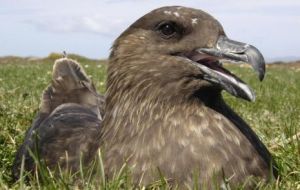MercoPress. South Atlantic News Agency
Falklands’ skua population has declined by almost half in five years
 The Falkland skua is a subspecies of the brown skua
The Falkland skua is a subspecies of the brown skua The number of Falkland Islands skua has declined by almost half in just five years, a survey of the bird's largest breeding ground reveals. It is unclear why the population has crashed on New Island, on the west of the Falkland Islands.
Something appears to be limiting the birds' ability to reproduce, say scientists.
That raises questions over the health of the wider marine environment in the south-west Atlantic Ocean. Skuas are gull-like birds that nest on the ground, with species living from the Arctic to Antarctica.
The Falkland skua is a subspecies of the brown skua.
“Although brown skuas have been the subject of many studies, virtually nothing has been done on the Falklands subspecies,” Dr Paulo Catry of the Museum of Natural History in Lisbon, Portugal, told BBC News.
So he and colleagues from Portugal and the UK conducted two surveys, five years apart, of the largest population of Falkland skuas, which nest on New Island.
The results have been published in the journal Polar Biology.
“Falkland skuas are really tame and do not hide their nests, which are placed in the open ground, which made the censuses quite easy, even if labour intensive for the amount of ground that needed to be covered.
”Birds are so tame that many individuals will remain sitting on the eggs even if you approach and touch them,“ he said.
Overall, the number of Falkland skua territories on New Island suffered a reduction of 47.5% in the five years between the two surveys, conducted in 2004 and 2009, which equates to a decline of 12.1% per year.
”Given this is the largest known colony for the species, currently with 333 pairs, this decline should obviously raise some concerns.
“In fact, long-lived seabirds like skuas usually change their numbers slowly and this situation cannot be considered as 'normal'.”
The reason for the crash is not clear, and just a few thousand pairs of Falkland skuas now remain worldwide, living on the Islands and a few along the coast of Argentina.
“We were very surprised that the decline in numbers was so fast, particularly considering that other seabirds on New Island seem to have been doing quite well over the same past five to six years,” he told the BBC.
Brown skuas generally enjoy a high breeding success, with each pair raising a chick a year on average.
But Falkland skuas are today producing just 0.28 chicks on average per pair each year.
Large skuas, and Falkland skuas in particular, rarely start nesting before they are six years old.
Usually, immature skuas gather at specific sites, known as “clubs”, on the nesting islands in the years before they start breeding.
In large colonies, hundreds of birds gather in these clubs.
But Dr Catry's team has never managed to locate any club site at New Island.
It remains unclear whether this decline in reproductive success has been accompanied by a rise in the number of deaths of adult skuas.
“This decline seems to be linked to an abnormally low reproductive output, the causes of which are still to be identified,” said Dr Catry.
“We are currently working on these questions. They are important not only for the sake of Falkland skuas, but more generally, for the marine environment of the Falkland Islands.”
One possibility is that the Falkland skua is suffering at the hands of a competitor.
Falkland skuas prey on a smaller bird, the thin-billed prion, and its eggs; but so too does another prion predator, the striated caracara, a falcon-like bird of prey.
The caracara's population has grown 15% a year in recent years, producing 2.5 chicks per nest per year, on average.
However, the Falkland skua's demise may be linked to wider problems.
“Falkland skuas are top predators of marine ecosystems. They will take fish, squid, crustaceans, and they are also important predators of other seabirds,” said Dr Catry.
“If something is not well with them, it may mean that something is not well with the rich Patagonian shelf ecosystem.
”Many Falkland Island seabirds have known important declines over the past decades. We need to learn more about what is driving these changes, and skuas may help us with that” (BBC).-




Top Comments
Disclaimer & comment rules-

-

-

Read all commentsCue all the RG Bingham fans......
Apr 07th, 2011 - 12:21 pm 0“Overfeeshing.....OVERFEEEESHING....MALVINAS SON ARGENTINAS” etc etc
Kelpers eat babies, allegedly.
Apr 07th, 2011 - 01:12 pm 0(1) Westi
Apr 07th, 2011 - 01:44 pm 0If you say so.....................
Commenting for this story is now closed.
If you have a Facebook account, become a fan and comment on our Facebook Page!